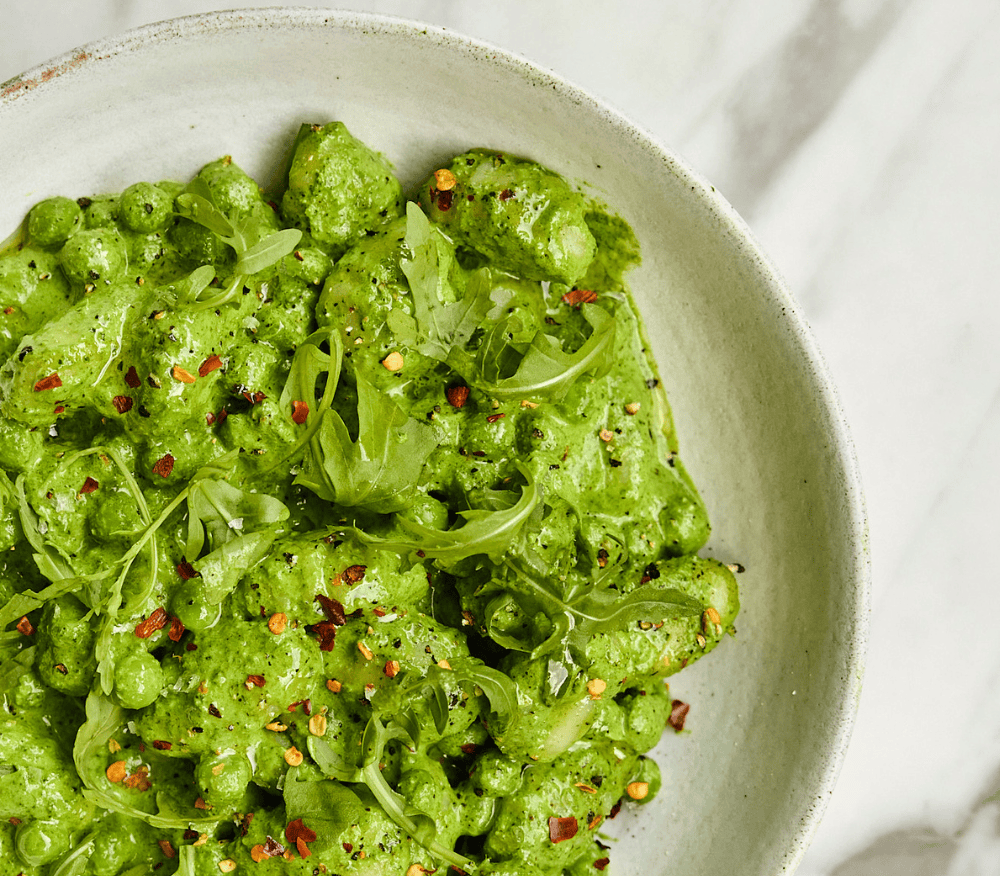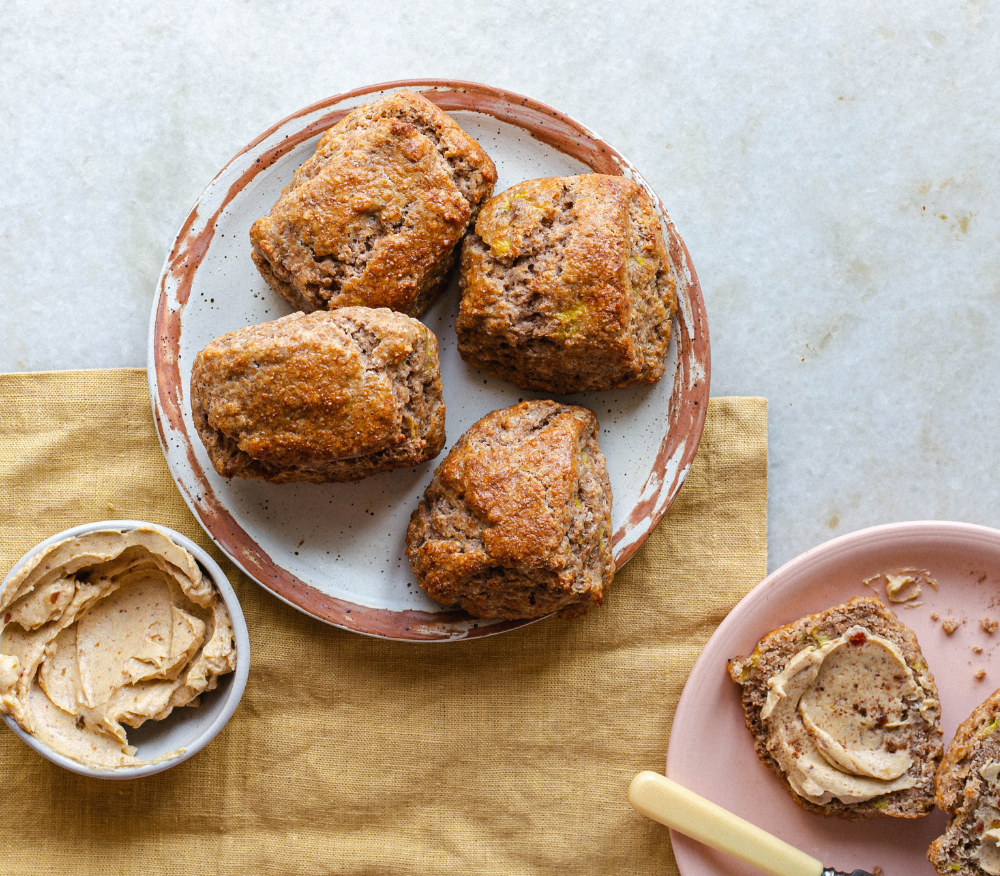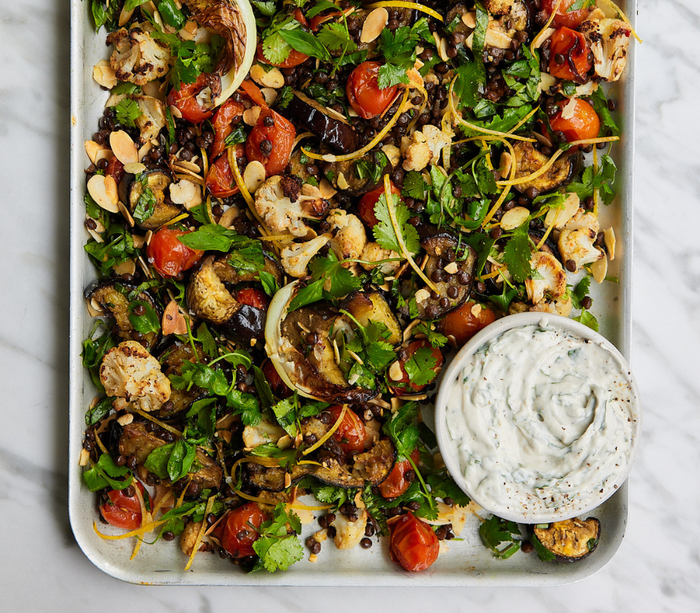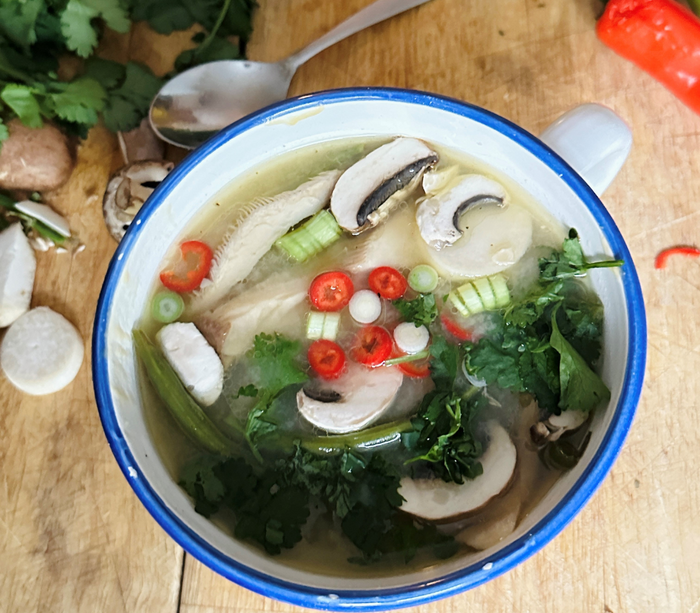October: Week Six
Hit play on our relaxed cooking playlist
Day 1: Creamy Cavolo Nero Gnocchi
How does it support my immune health?
Garlic is a must in this dish. The compounds in garlic (such as caffeic acid and S-allyl-L-cysteine) are thought to have anti-inflammatory effects and increase the functioning of certain immune cells, such as macrophages, natural killer (NK) cells, and specialist T and B cells.
Peas are a good source of protein which acts as building blocks for immune cells and antibodies, whereas broccoli contains distinctive sulphur-containing plant chemicals, including glucosinolates.
Day 2: Roasted Banana and Spelt Scones with Date Butter
How does it support my immune health?
Bananas contain vitamin C which supports immune health by neutralising harmful compounds (known as free radicals) that are known to damage cells. Greener (unripe) bananas contain higher amounts of resistant starch (compared with yellow ones) – a a type of fermentable fibre that acts as ‘food’ for your gut microbiome. In return, your gut microbes release health-promoting compounds into the gut, such as short chain fatty acids (SFCAs).
Dates contain a mix of fibres, such as cellulose and pectin, as well as B vitamins which play a role in shaping the health of the gut microbiome.
Day 3: Cauliflower Traybake with Garlic Yoghurt
How does it support my immune health?
Cauliflower is part of the cruciferous veggie group which also includes broccoli, cabbage, and kale. This group is an important one because it contains distinctive sulphur-containing plant chemicals, including glucosinolates. Glucosinolates are almost exclusively found in these veggie types and have been linked with anti-inflammatory and immune-strengthening effects. In fact, studies have shown a lower risk of gut-related cancers with increased consumption.
Another key ingredient in this dish is aubergine (or eggplant). These are particularly high in anthocyanins – the purple pigments found in the skin. Anthocyanins have potent anti-inflammatory effects and support immune health by neutralising harmful compounds (known as free radicals) that are known to damage cells.
Day 4: Orange and Carrot Cake
 How does it support my immune health?
How does it support my immune health?
Carrots are a rich source of vitamin A and C – both of which are important for immune health. Vitamin A support the function of many types of immune cells including macrophages, T cells and B cells. Vitamin A also bolsters defence against several infections.
Another ingredient in this dish is ground almonds. Almonds are rich in several nutrients known for supporting immunity, including vitamin E. In fact, vitamin E has potent anti-inflammatory effects and is well recognised for its role in immune function (especially specialist T cells) and helping to reduce the risk of infections.
Day 5: Berry Breakfast Pots
 How does it support my immune health?
How does it support my immune health?
Another key ingredient in this recipe is chia seeds. These are packed full of nutrients, including omega 3 fatty acids (specifically alpha-linolenic acid; ALA), fibre (around 10g fibre per two tablespoons), and plant chemicals (such as caffeic acid, quercetin, myricetin, kaempferol and chlorogenic acid) - all of which support the immune system to function at its best.
The berries in this jelly - such as raspberries and strawberries – stand out for their high amounts of polyphenols, such as anthocyanins. These are the red-purple pigments that have potent anti-inflammatory effects and give berries their vibrant colour.
Berries appear to promote the growth of beneficial microbes. For example, mucin-producing microbes that can protect the lining of the gut.
Day 6: Spicy Udon Noodles With Chilli Tahini Sauce
How does it support my immune health?
Broccoli is part of the cruciferous veggie group which also includes cauliflower, cabbage, and kale. This group is an important one because it contains distinctive sulphur-containing plant chemicals, including glucosinolates. Glucosinolates are almost exclusively found in these veggie types and have been linked with anti-inflammatory and immune-strengthening effects. In fact, studies have shown a lower risk of gut-related cancers with increased consumption.
Carrots are a rich source of vitamin A and C – both of which are important for immune health. Vitamin A support the function of many types of immune cells including macrophages, T cells and B cells. Vitamin A also bolsters defence against several infections.
Day 7: Mushroom Miso Tom Yum with Green Beans
How does it support my immune health?
The beta-glucans (type of fibre) found in mushrooms have been found to increase the activity of immune cells, such as macrophages and dendritic cells. Beta-glucans also act as ‘food’ for your gut microbiome. In return, your gut microbes release health-promoting compounds into the gut, such as short chain fatty acids (SFCAs).
Green beans contain vital nutrients including calcium, magnesium, potassium, as well as vitamin C and K. Vitamin K is linked with anti-inflammatory activities. What’s more, certain gut microbes are able to produce vitamin K, helping to contribute to vitamin K status.
Hungry for more? Dig into the next batch of gut-immune-supportive recipes
Discover more tips to help support your gut-immune connection.










